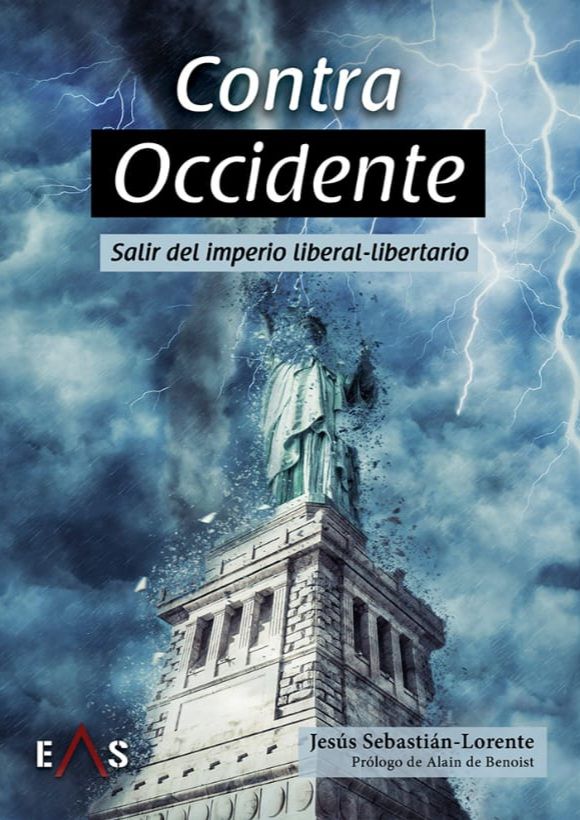We are so very pleased to provide this translation of the Prologue to the recent book by Jesús Sebastián-Lorente, entitled, Contra Occidente. Salir del imperio liberal-libertario (Against the West: Exiting The Liberal-Libertarian Empire). The Prologue is by Alain de Benoist, the well-known thinker and philosopher of what is known as the New Right.
The subject of the book itself is an intriguing one in that it calls into question the commonly used terms, “the West” and “Europe.” This excerpt comes through the generous courtesy of El Manifesto.
The title of this book, Contra Occidente (Against the West), published by EAS, will undoubtedly surprise some readers, accustomed to thinking that the terms “Europe” and “the West” are more or less synonymous. However, one of this book’s great merits is precisely to demonstrate that these terms, far from being synonyms, refer today to totally opposite realities.
Raymond Abellio observed that “Europe is fixed in space, that is, in geography,” while the West is “mobile.” In fact, “the West” has not stopped traveling and changing direction. Initially, the term referred only to the land of the setting sun (Abendland), as opposed to the land of the rising sun (Morgenland).
From the reign of Diocletian, at the end of the 3rd century AD, the opposition between East and West was reduced to the distinction between the Western Roman Empire (whose capital was Milan, later Ravenna) and the Eastern Roman Empire established in Constantinople. The West and Europe then became permanently and lastingly confused. However, from the 18th century onwards, the adjective “Western” was also used in maritime cartography to refer to the New World, also called the “American system,” as opposed to the “European system” or the “Eastern Hemisphere” (which then included Europe as well as Africa and Asia).
In the interwar period, the West, always assimilated to Europe (e.g., Spengler), was globally opposed to the East, which became, at the same time, an object of fascination (René Guénon) or a counterpoint (Henri Massis). During the Cold War, the West regrouped Western Europe and its Anglo-Saxon allies, England and the United States, to oppose, in this case, the “Eastern bloc” dominated by Soviet Russia. This understanding, which allowed the United States to legitimize its hegemony, survived the fall of the Soviet system, as can be seen in those who always try to mobilize the “Western bloc” against Russia (and also against China).
Today, the West has changed direction once again. Sometimes, it is given a purely economic definition: all developed, modernized, industrialized countries are called “Western,” including Japan and South Korea, as well as Australia, former countries of the East, North America and a part of Latin America. “Ex Oriente lux, ex Occidente luxus,” as the Polish writer Stanislaw Jerzy Lec jocularly put it. The West thus loses all its spatial content to become confused with the notion of modernity. At other times, it is globally opposed to the latest incarnation to date of the furor orientalis in the eyes of Westerners: Islamism. In this vision, an essential fracture opposes the “Judeo-Christian West” to the “Arab-Muslim East.” Since there is no longer a unitary “West,” just as there is no homogeneous “East.” This is a new source of misunderstanding.
But more importantly, above all, the notion of the “West,” as it is understood today, is a geopolitical aberration. Europe belongs to the “land power,” while the United States represents the “sea power.” History, said Carl Schmitt, is first and foremost a history of the struggle between continental powers and maritime powers. Despite all that is repeated in Brussels and Washington, the interests of Europeans and Americans are not convergent, but opposed. As for the notion of the “Christian West,” which for too long has made us forget the universal (and universalist) dimension of the Christian religion, it has lost all meaning since religion has become a private affair and, above all, since the majority of believers are located in the Third World. Europe and the West are, today, totally separated—to the point that defending Europe means, quite often, fighting the West. As it no longer relates to any particular geographical or even cultural area, the word “West” should be abandoned.
Since its conversion to universalism, the West has always considered its specific values as “universal” values, and has since then been legitimized to impose them on the whole world. In the Third World, attempts were first made to make people worship the “true God” (the only one, of course), then to bring “civilization,” “progress,” “democracy,” and, finally, “development” to the Third World. The ideology of human rights does not escape the rule. Although it is historically and geographically perfectly situated, it seeks to reshape the planet in the name of an “abstract man,” a man from everywhere and nowhere. The United States is, naturally, the first champion of this ideology, because, for them, Africans are nothing more than black-skinned Westerners, and Europeans are “Americanizable” populations speaking (provisionally) a foreign language. This explains their disappointments in international politics. The world will only be comprehensible to them when it has been totally Americanized.
It is because of their universalism that Westerners find it so difficult to understand (and admit) otherness. Their deep conviction is that differences between cultures and peoples are transitory, secondary, soluble in folklore, even downright harmful. In other words, they admit the Other only to the extent that they believe they can demonstrate that the Other is “like everyone else;” that is, the Same. The ideal of the society of individuals is a society where all men are interchangeable, substitutable for one another, all equally committed to the compulsive model of happiness through consumption. A certain egalitarianism, which makes equality a synonym for “sameness,” pushes in this same direction. It is another form of racism: in the absence of being able to make those who are different disappear, differences (between peoples and between the sexes) are devalued as illusory or insignificant. Political universalism, the demand for a “right to indifference” and gender ideology converge in this same aspiration to indifferentization, which is, at bottom, nothing more than a “death wish.”
So far, slightly more than 200 books and academic works have been published, in various languages, entirely devoted to the French New Right and to my writings. Their quality is obviously uneven. Favorable or hostile, some are quite serious, or at least scientific in appearance; some are even quite good. However, the truth demands to say that the vast majority are properly miserable.
Reading this infra-literature, one finds that the procedures employed are always the same. The most common method consists of coldly copying what other authors have previously written, without bothering for a moment to investigate whether or not it corresponds to reality. Ten previous books are taken and summarized to make the eleventh. This is how the same factually false information, invented quotations of all kinds, the same amalgamations, the same judgments of intention, travel from one writing to another, as if the indefinitely repeated lies became many truths.
Another common procedure is that of selective reading: the conclusion to be reached is already established beforehand, everything that can serve to prove the thesis is retained, discarding everything that could contradict it. There is also the “anti-historical” or anachronistic method, which does not understand the need to periodize the history of a school of thought that is already more than half a century old: quotations are never dated, which makes it possible to unearth phrases that are forty or fifty years old, while pretending to keep them as contemporary or as representative of what the same author is writing today, as if in half a century his thought had never evolved. In other cases, phrases are cut, mutilated, extracted from their context, or even sent back, not to what this or that author may have said, but to a comment made by a hostile author.
Speculations on the “unsaid” are equally fruitful. Failing to find in an author’s writings what we would like to find there, we try to “decode” his discourse, to “read between the lines.” Rather than being interested in what is actually written, the main concern is to know “from where it is inspired,” in the hope of establishing imaginary connections, fantastic organizational charts that allow us to conclude what the Anglo-Saxons call “guilt by association,” the eternal resource of low-level conspiracy theorists.
In all cases, the underlying idea is that what is written does not correspond to what is really thought, and may even mean the opposite. The idea that an intellectual or theorist would immediately discredit himself by saying something different from what he thinks (in which precisely he differs from the politician) is not even taken into account. The practice of suspicion is widespread. If something is written it is done only for “strategy,” to “make believe that,” to “play into the hands of” this or that. Those who engage in these contortions are, of course, in a better position than anyone else to know what everyone really thinks. And, of course, any denial is taken as confirmation! One can immediately see the policing nature of this way of doing things. The policing of the (supposed) ulterior motives of thought is added to the policing of thought, for whatever one does, one is always guilty. The work of thought is simply ignored.
Another thing that has always struck me is that many foreign authors who have written on the French New Right are obviously incapable of reading French, which at first sight is surprising. At best, they have only been able to have access to a few books published in their language, which is completely insufficient to acquire an overview of the issue. Rather than a major book that has not been translated, they will cite a minor book that has. Otherwise, they are reduced to relying on more or less trusted secondary sources.
Of course, they could try to verify some claims, but apparently that does not seem to suit them. One revealing fact: I can count on the fingers of one hand the number of authors who have written books about my work and who have taken the trouble to contact me, in one way or another, to ask me some questions, to try to clarify some problematic points, etc. The rest obviously had no need, or even any desire, to meet in vivo with the supposed subject of their studies. It is a way of “working” that says a lot about such authors.
This is not how Jesús Sebastián-Lorente works. He works with method, with honesty, with passion. We will see this by reading this book, in which his multiple references to the works of the New Right do not prevent him from expressing personal thought. In general, I agree with everything he writes, with a few exceptions perhaps, but this is just a detail! I am convinced that his book will be a landmark in Spain.
Featured image: “Leaving the Studio,” by William McGregor Paxton, painted in 1912.

